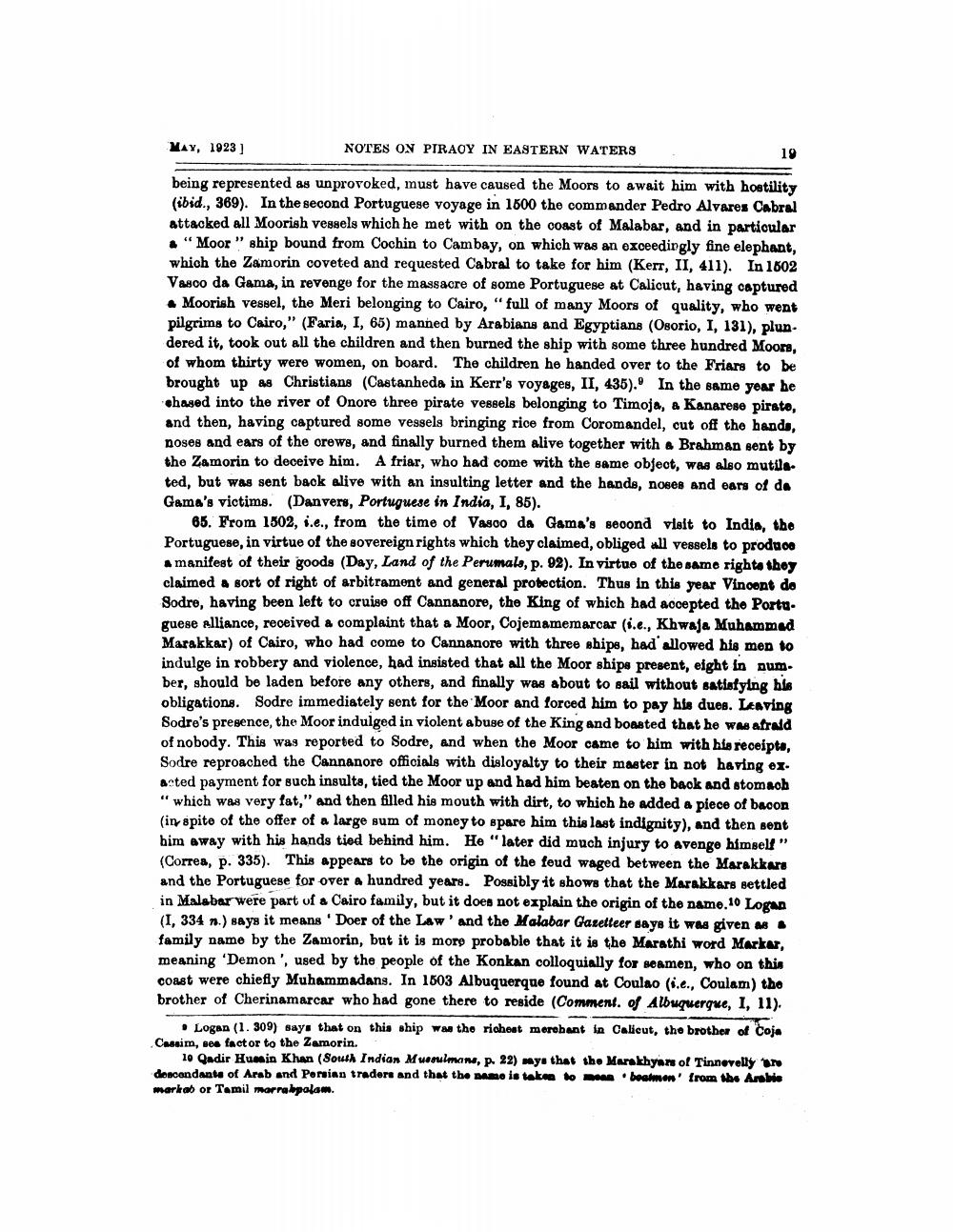________________
May, 1923 ]
NOTES ON PIRAOY IN EASTERN WATERS
19
being represented as unprovoked, must have caused the Moors to await him with hostility (ibid., 369). In the second Portuguese voyage in 1600 the commander Pedro Alvares Cabral attacked all Moorish vessels which he met with on the coast of Malabar, and in particular
"Moor" ship bound from Cochin to Cambay, on which was an exceedingly fine elephant, which the Zamorin coveted and requested Cabral to take for him (Kerr, II, 411). In 1602 Vasco da Gama, in revenge for the massacre of some Portuguese at Calicut, having captured
Moorish vessel, the Meri belonging to Cairo, "full of many Moors of quality, who went pilgrims to Cairo," (Faria, I, 65) manned by Arabians and Egyptians (Osorio, I, 131), plun. dered it, took out all the children and then burned the ship with some three hundred Moore, of whom thirty were women, on board. The children he handed over to the Friars to be brought up as Christians (Castanheda in Kerr's voyages, II, 435). In the same year he ehased into the river of Onore three pirate vessels belonging to Timoja, a Kanarese pirate, and then, having captured some vessels bringing rice from Coromandel, cut off the hands, noses and ears of the crews, and finally burned them alive together with a Brahman sent by the Zamorin to deceive him. A friar, who had come with the same object, was also mutilated, but was sent back alive with an insulting letter and the hands, noses and ears of de Gama's victims. (Danvers, Portuguese in India, I, 85).
65. From 1502, i.e., from the time of Vasco da Gama's second visit to India, the Portuguese, in virtue of the sovereign rights which they claimed, obliged wall vessels to produce a manifest of their goods (Day, Land of the Perumala, p. 92). In virtue of the same rights thoy claimed a sort of right of arbitrament and general protection. Thus in this year Vinoont do Sodre, having been left to cruise off Cannanore, the King of which had accepted the Portoguese alliance, received a complaint that a Moor, Cojemamemarcar (i.e., Khwaja Muhammad Marakkar) of Cairo, who had come to Cannanore with three shipe, had allowed his men to indulge in robbery and violence, had insisted that all the Moor ships present, eight in num. ber, should be laden before any others, and finally was about to sail without satisfying his obligations. Sodre immediately sent for the Moor and forced him to pay his dues. Leaving Sodre's presence, the Moor indulged in violent abuse of the King and boasted that he was afraid of nobody. This was reported to Sodre, and when the Moor came to him with his receipta, Sodre reproached the Cannanore officials with disloyalty to their master in not having ex. acted payment for such insults, tied the Moor up and had him beaten on the back and stomach "which was very fat," and then filled his mouth with dirt, to which he added a piece of bacon (in spite of the offer of a large sum of money to spare him this last indignity), and then sent bim away with his hands tied behind him. He "later did much injury to avenge himself" (Corres, P. 335). This appears to be the origin of the feud waged between the Marakkars and the Portuguese for over a hundred years. Possibly it shows that the Marakkars settled in Malabar were part of a Cairo family, but it does not explain the origin of the namo.10 Logan (1. 334 m.) says it means 'Doer of the Law' and the Malabar Gazetteer says it was given as family name by the Zamorin, but it is more probable that it is the Marathi word Marker, meaning 'Demon', used by the people of the Konkan colloquially for seamen, who on this coast were chiefly Muhammadans. In 1803 Albuquerque found at Coulao (i.e., Coulam) the brother of Cherinamarcar who had gone there to reside (Comment. of Albuquerque, I, 11).
Logan (1. 309) says that on this ship was the richest merebant in Calicut, the brother of Coja Cassim, ses factor to the Zamorin.
10 Qadir Humein Khan (South Indian Musulmans, p. 22) mye that the Marakhyans of Tinnevellyn descendants of Arab and Ponian traders and that the man is taken to me boalmen from the Arabie markab or Tamil marrabpolam.




